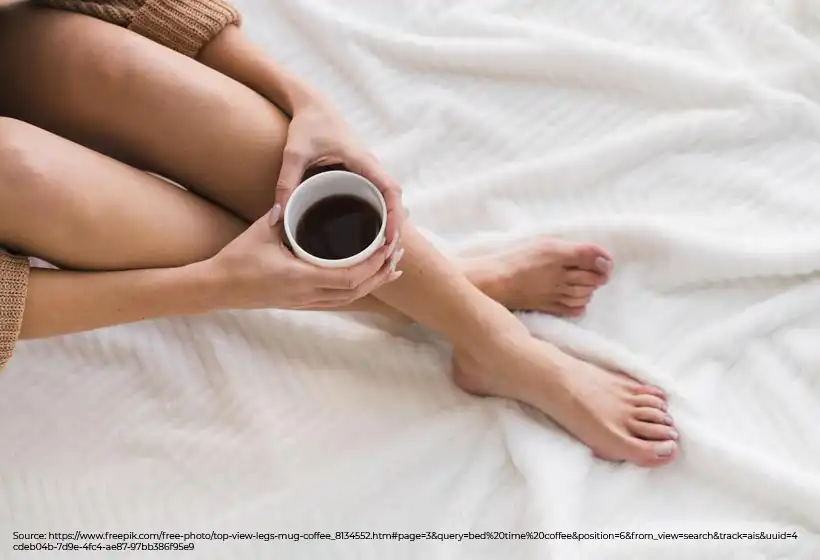Why Is Coffee Making You Tired? Science Behind Better Sleep!

Do you love your morning cup of coffee, but feel like it’s making you more tired than energized?
You’re not alone. Many people experience a paradoxical effect of coffee, where instead of feeling alert and focused, they feel fatigued and sleepy.
Why does this happen, and how can you avoid it?
In this article, we’ll explore the science behind sleep & coffee, and offer you some tips on how to enjoy your coffee without compromising your sleep quality.
Does Coffee Lead to Sleep Deprivation?
Coffee is one of the most popular beverages in the world. An estimated 87% of Americans are coffee-obsessed with around 2.25 billion cups of coffee being consumed globally every day. Coffee contains caffeine, a stimulant that stops the action of adenosine. Adenosine is a hormone which makes you feel sleepy. By blocking adenosine, caffeine can temporarily boost your energy, mood, and cognitive performance.
However, caffeine can also interfere with your sleep in several ways.
- First, caffeine has a half-life of about 5 to 6 hours, which means that it takes that long for your body to eliminate half of the caffeine you consumed. This means that if you drink coffee in the afternoon or evening, you may still have caffeine in your system when you go to bed, which can make it harder for you to fall asleep and leave you always feeling tired and sleepy.
- Second, caffeine can disrupt your circadian rhythm, which is your natural 24-hour cycle of sleep and wakefulness. Several factors influence the circadian rhythm of your body. These are:
- light
- temperature, and
- hormones
Now melatonin is a hormone that regulates your circadian rhythm and it is produced by your pineal gland in response to darkness. Melatonin helps you feel sleepy and prepares your body for sleep.
However, caffeine can suppress the production of melatonin, which can delay your sleep onset and leave you feeling sleepy all the time.
- Third, caffeine can affect the quality and quantity of your sleep stages, which are the different phases of sleep that your brain and body go through during the night.
Humans have 2 Sleep Stages: Rapid-Eye-Movement (REM) and Non-Rapid-Eye-Movement (NREM).
REM sleep is the stage where you have vivid dreams, and it is important for memory consolidation, learning, and emotional regulation.
NREM sleep has 3 stages: 1st stage, 2nd stage, and 3rd stage. During deep sleep or stage 3 your body goes through the most restorative sleep state. During this stage your body repairs itself, strengthens your immune system, and releases growth hormone.
Caffeine can reduce the amount and quality of both REM and deep sleep, which can lead to sleep deprivation and impair your physical and mental health.
Symptoms of Sleep Deprivation
Here’s the paradox.
Coffee, a common remedy for fatigue, can in turn contribute to sleep deprivation.
Caffeine’s stimulating effects may hinder the ability to fall asleep, exacerbating the cycle. Despite temporarily boosting alertness, reliance on coffee disrupts the natural sleep-wake rhythm, leading to chronic sleep deprivation.
Discussed below are a few symptoms of sleep deprivation.
- Daytime Fatigue: Consistent lack of energy during waking hours.
- Excessive Sleepiness: Persistent feeling of being overly tired.
- Irritability: Increased sensitivity to stress and annoyance.
- Dependency on Stimulants: Caffeine can exacerbate sleep deprivation.
- Insomnia Cycle: Lost sleep at night followed by reliance on caffeine during the day, creating a harmful cycle.
- Frequent Yawning: A classic sign of the body’s struggle for alertness.
These lack of sleep symptoms and prolonged sleep deprivation disrupts internal systems, triggering effects beyond initial symptoms mentioned earlier.
Sleep Deprivation – Effects
Let’s now discuss how sleep deprivation affects the different organ systems of your body.
- Central Nervous System
- Memory and Learning: During sleep, neural pathways crucial for memory and learning are formed. Sleep deprivation impairs this process, leading to difficulties in remembering new information.
- Concentration: Lack of sleep makes concentration challenging, hindering cognitive functions and increasing the likelihood of errors and accidents.
- Mood and Emotions: Sleep deprivation contributes to irritability, mood swings, anxiety, and even hallucinations, impacting emotional well-being.
- Immune System
- Infection-Fighting Substances: Adequate sleep supports the production of antibodies and cytokines, crucial for fighting infections. Sleep deprivation weakens this defense, making the body more susceptible to illnesses and slowing down recovery.
- Respiratory System
- Obstructive Sleep Apnea (OSA): Sleep deprivation exacerbates OSA, a condition where breathing interruptions occur during sleep. This not only disrupts sleep but also increases vulnerability to respiratory infections and worsens pre-existing respiratory conditions.
- Digestive System
- Hunger Hormones: Sleep loss disrupts hormones like leptin and ghrelin, leading to increased appetite and overeating. This hormonal imbalance, combined with reduced physical activity, contributes to weight gain and obesity.
- Insulin Function: Sleep deprivation impairs insulin function. It disrupts your body’s blood sugar levels and further increases the risk of getting affected by diabetes and obesity.
- Cardiovascular System
- Heart Health: Sleep influences blood pressure, inflammation levels, and overall cardiovascular health. Prolonged sleep deprivation heightens your risk of getting affected by cardiovascular diseases or heart strokes.
- Endocrine System
- Hormone Production: Interruptions in sleep impact hormone production, particularly testosterone and growth hormone. This disruption can affect muscle mass, cell repair, and growth processes, especially in children and adolescents.
- Treatment
- Sleep Duration: The primary treatment for sleep deprivation is ensuring sufficient sleep, typically 7-9 hours per night.
- Professional Help: Consultation with a doctor or sleep specialist may be necessary to diagnose and treat any underlying causes related to your sleep disorder. These may be causes like sleep apnea, narcolepsy, or insomnia.
- Sleep Study: Diagnosis often involves a sleep study, conducted at a sleep center or using at-home monitoring options.
- Interventions: Treatment may include medications or devices (e.g., CPAP for sleep apnea) to address specific sleep disorders and improve overall sleep quality.
Tired All The Time? Is Coffee To Blame?

As you can see, coffee can have a negative impact on your sleep, which can leave you feeling tired the next day.
But why does coffee sometimes make you feel tired right after drinking it?
There are a few possible explanations for this phenomenon.
- Sugar Crash
If you add sugar or sweeteners to your coffee, you may experience a spike and a crash in your blood glucose levels, which can make you feel tired and sluggish. Sugar can also increase inflammation in your body, which can lead to feeling sleepy all day.
- Dehydration
Coffee is a diuretic, which means that it makes you urinate more frequently. This can cause your body to suffer from dehydration. Dehydration can lead to a series of other associated problems such as headache, dizziness, fatigue, and dry mouth. Further, a dehydrated body suffers irregularity in blood pressure and heart rate, which can leave you feeling tired.
- Tolerance and Withdrawal
If you have coffee routinely, you may develop a certain level of tolerance to its effects, which means that you need more caffeine to get the same boost of energy. However, if you don’t get enough caffeine, you may experience withdrawal symptoms. Some of these symptoms are anxiety, irritability, headache, and extreme fatigue.
- Adenosine Rebound
Like we mentioned earlier, caffeine blocks the action of adenosine, which makes you feel sleepy. However, caffeine doesn’t stop the production of adenosine, which continues to accumulate in your brain while you drink coffee. When the caffeine wears off, the adenosine receptors are suddenly flooded with adenosine, which can make you feel more sleepy than before you drank coffee. This is known as the adenosine rebound effect, and it can contribute to fatigue causes and feeling sleepy all the time.
Top 5 Tips: How Do You Enjoy Coffee Without Feeling Exhausted?
Coffee is not all bad.
It has many health benefits. Drinking quality coffee at the right time of the day and in the right amount reduces your risk of getting type-2 diabetes, Parkinson’s disease, Alzheimer’s disease, and some cancers. Further, coffee can uplift your mood, increase creativity, and heighten productivity, if consumed in moderation and at the right time.
Here are some tips on how to enjoy coffee without feeling tired.
- Top 1: Limit Your Intake
Adults are recommended a daily intake of 400 mg caffeine, which is equivalent to about 4 cups of brewed coffee. However, this may vary depending on your age, weight, health conditions, and individual sensitivity to caffeine. To avoid the negative effects of coffee on your sleep, try to limit your intake to 1 or 2 cups per day, and avoid drinking coffee after 2 pm.
- Tip 2: Drink Water
To prevent dehydration and its associated symptoms, make sure to drink plenty of water throughout the day, especially if you drink coffee. A good rule of thumb is to drink one glass of water for every cup of coffee you consume.
- Tip 3: Avoid Sugar and Additives
To avoid the sugar crash and the inflammation that can make you feel tired, opt for black coffee or coffee with low-fat milk or plant-based alternatives. Avoid adding sugar, syrups, whipped cream, or other sweeteners to your coffee, as they can increase your calorie intake and affect your blood glucose levels.
- Tip 4: Choose Quality Coffee
The quality of your coffee can also affect how you feel after drinking it. Choose organic, fair-trade, and freshly roasted coffee beans, and grind them yourself before brewing. This can ensure that your coffee is free of pesticides, mold, and other contaminants that can affect your health and taste.
In case you are looking for quality organic coffee or decaf coffee, check out the list on coffee varieties and types. It also explains how coffee makes its way from coffee plant to café!
- Tip 5: Get Enough Sleep

The best way to avoid feeling tired is to get enough sleep. The recommended amount of sleep for adults is 7 to 9 hours per night, but this may vary depending on your age, lifestyle, and individual needs. To improve your sleep quality, follow a regular sleep schedule, avoid caffeine, alcohol, and nicotine before bed, create a comfortable and dark sleeping environment, and avoid using electronic devices at least an hour before bed.
Getting enough sleep can help you prevent excessive sleepiness and daytime sleepiness, and improve your overall health and well-being.
Smart-Take!
Coffee is a wonderful drink that can offer many benefits, but it can also make you feel tired if you drink too much, too late, or with too much sugar. To enjoy your coffee without feeling tired, limit your intake, drink water, avoid sugar and additives, choose quality coffee, and get enough sleep. By following these tips, you can have the best of both worlds: a delicious cup of coffee and a refreshing night of sleep.
Disclaimer
The above content offers general guidance and is not a substitute for professional advice. It is not meant for the diagnosis of sleep or mental health issues. Before making any changes to your sleep routine, we highly advise consulting a healthcare professional for personalized guidance and support.
References
- Cappelletti, S., Daria, P., Sani, G. and Aromatario, M., 2015. Caffeine: cognitive and physical performance enhancer or psychoactive drug?. Current neuropharmacology, 13(1), pp.71-88.
https://www.ncbi.nlm.nih.gov/pmc/articles/PMC4462044/ - O’callaghan, F., Muurlink, O. and Reid, N., 2018. Effects of caffeine on sleep quality and daytime functioning. Risk management and healthcare policy, pp.263-271.
https://www.ncbi.nlm.nih.gov/pmc/articles/PMC6292246/ - Shi, D., Nikodijević, O., Jacobson, K.A. and Daly, J.W., 1993. Chronic caffeine alters the density of adenosine, adrenergic, cholinergic, GABA, and serotonin receptors and calcium channels in mouse brain. Cellular and molecular neurobiology, 13, pp.247-261.
https://www.ncbi.nlm.nih.gov/pmc/articles/PMC3437321/ - Reichert, C.F., Deboer, T. and Landolt, H.P., 2022. Adenosine, caffeine, and sleep–wake regulation: state of the science and perspectives. Journal of Sleep Research, 31(4), p.e13597.
https://www.ncbi.nlm.nih.gov/pmc/articles/PMC9541543/
